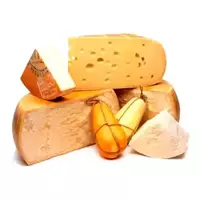Cheese

Cheese belongs to the category of food products that are obtained from milk using lactic acid bacteria and coagulating enzymes. The useful properties of cheese have been known for 70 centuries. And today this wonderful product is present in the kitchen of almost every person.
The taste and gastronomic value of this dairy product largely depends on the variety of cheese, as well as the correct combination of drinks and products that are served along with this treat. Cheese sandwiches familiar to many do not reveal its full taste and aroma. For example, juicy and sweet fruits are well suited to many soft and hard varieties. The most successful option can be called a cheese and fruit canape. It's a good idea to add this product to summer green salads, which the cheese gives a certain density and sharpness.
Perfectly combined cheese and hot dishes. The juicy taste of the food will give young cheese, while the more aged varieties are a special aroma and crispy crust. The choice of alcoholic beverages is also important: wine is an ideal option. Hard cheese is served with tart wines, and more delicate varieties require delicate grape drinks.
Composition of cheese
From a dietary point of view, cheese is a unique food product, since even some types of meat are superior in nutritional value. The composition of the cheese completely repeats the composition of milk, only in a more significant concentration. For example, cow's milk contains
3. 2 percent of proteins, and cheese contains at least 20 percent of them. In addition, the calorie content of the cheese is quite high, so it belongs to hearty and nutritious products.
Cheese proteins by the presence of amino acids are close to proteins of human organs and tissues, due to which the composition of cheese is considered very useful. In addition, this milk product also contains such necessary amino acids that the body does not produce independently - methionine, tryptophan and lysine.
Cheese varieties
Cheese is both an everyday product and a delicacy at the same time. And all because there are countless types and varieties of cheese. First of all, according to the production method, this product is divided into solid, soft, brine and processed (melted). The most common in our country are:
Altai cheese;
Adyghe cheese;
brynza cheese;
Dutch cheese;
gorgonzola cheese;
homemade cheese;
dor bleu cheese;
green cheese;
goat cheese;
Kostroma cheese;
camembert cheese;
kurt cheese;
Lithuanian cheese;
Latvian cheese;
mascarpone cheese;
Moscow cheese;
mozzarella cheese;
Ossetian cheese;
Poshekhon cheese;
parmesan cheese;
pecorino cheese;
processed cheese;
Baltic cheese;
ricotta cheese;
Russian cheese;
roquefort cheese;
cream cheese;
suluguni cheese;
Soviet cheese;
tofu cheese;
Ukrainian cheese;
Uglich cheese;
feta cheese;
philadelphia cheese;
cheddar cheese;
Swiss cheese;
Estonian cheese;
emmental cheese;
Yaroslavl cheese.
The benefits of cheese
Speaking of the benefits of cheese, the first thing that comes to mind is the huge amount of minerals and vitamins in its composition. This not only has a beneficial effect on the state of the body as a whole, but also helps to cope with some diseases.
The benefits of cheese are invaluable for a person, thanks to its properties it is easy and fully absorbed in the body. Doctors strongly advise regular consumption of this wonderful product for children, pregnant and elderly people, as well as those who suffer from bone damage and tuberculosis.
Harm of cheese
In addition to useful qualities, they often remember the possible harm of cheese. They advise people with urolithiasis, stomach diseases, acute pyelonephritis, gastritis with increased acidity and colitis to use cheeses in minimal quantities or completely abandon them.
350 kCal cheese
Energy value of cheese (Ratio of proteins, fats, carbohydrates - ju):
Proteins: 26.3 g (~ 105 kCal)
Fats: 26.6 g (~ 239 kCal)
Carbohydrates: 0 g (~ 0 kCal)
Energy ratio (bj | y): 30% | 68% | 0%
 Español
Español Français
Français Português
Português Русский
Русский 简体中文
简体中文 繁體中文
繁體中文 日本語
日本語 한국어
한국어 العربية
العربية Türkçe
Türkçe Қазақ
Қазақ Deutsch
Deutsch Italiano
Italiano Українська
Українська
